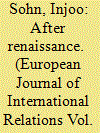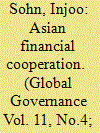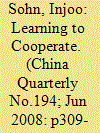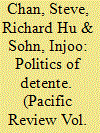| Srl | Item |
| 1 |
ID:
110828


|
|
|
|
|
| Publication |
2012.
|
| Summary/Abstract |
Why does a re-emerging China pursue institutional strategies to expand its multilateral ties all over the world? This study explains the genesis of China's new multilateral diplomacy toward Africa, Latin America, and the Middle East. The central argument of the study is that many strands of structural arguments drawn from realist, liberal, and constructivist insights cannot provide complete explanations about China's multilateral activism without recourse to cognitive feedback dynamics. China fed its regional experiences of multilateralism back into its global policy formation. This experiment-based approach has been a pervasive feature in Chinese multilateral diplomacy as well as Chinese domestic reforms during the post-Mao period. The cognitive feedback model developed in this study intends to complement the prominent structural explanations by identifying micro-level dynamics and seeks to contribute to today's debate over power transition and international order.
|
|
|
|
|
|
|
|
|
|
|
|
|
|
|
|
| 2 |
ID:
066780


|
|
|
| 3 |
ID:
082265


|
|
|
|
|
| Publication |
2008.
|
| Summary/Abstract |
This study explains the ideational sources of China's proactive multilateral diplomacy towards Asian financial co-operation by employing a learning thesis. Challenging prominent materialist explanations (power-transition thesis, realist balancing thesis and economic utility thesis), this study argues that the collective learning of Chinese policy elites through cognitive dissonance, feedback effects and transnational persuasion explains much of the change in China's relational identity and philosophical beliefs regarding regional co-operation. These prior ideational shifts helped to determine China's behaviour change from its muted opposition to Asian financial co-operation in the 1990s to its active support of regional financial co-operation in the early 2000s, as evidenced in the emergence of the Chiang Mai Initiative, Chinese-Japanese-South Korean trilateral financial co-operation and the Asian Bond Fund Initiative. Chinese learning also suggests that more fundamental changes in China's national preference may make its support for Asian financial co-operation more consistent and stable in the foreseeable future than sceptics might anticipate.
|
|
|
|
|
|
|
|
|
|
|
|
|
|
|
|
| 4 |
ID:
120212


|
|
|
|
|
| Publication |
2013.
|
| Summary/Abstract |
Why have relations across the Taiwan Strait and the 38th parallel on the Korean Peninsula undergone different processes of détente and reversal? We apply the perspective of two-level games to understand the divergent experiences of these two cases of contested sovereignty and regime rivalry. In particular, we call attention to the alignment and misalignment of domestic and international of interests and influences in our analysis, and the dampening and exacerbation of escalating recriminations in comparing these divergent experiences. Three phenomena are especially noteworthy. First, a third party, the US, is critical as a principal agenda setter. Washington's policies are important in abetting or hampering Seoul' and Taipei's domestic politics concerning policies toward their respective rivals. Second, Washington's policies are also important in influencing Beijing' and Pyongyang's policies, which in turn shape and even force responses from Seoul and Taipei. Therefore, policies tend to reverberate not just between domestic and foreign levels, but also across multiple borders in fostering cascades and echoes. Third, the extent to which political rapprochement is accompanied by economic integration is relevant. Extensive economic ties can serve as a brake to tension escalation, and produce resources and incentives that affect politicians' domestic competition and to alter their constituents' perceptions of the potential costs and benefits of pursuing détente and cooperation.
|
|
|
|
|
|
|
|
|
|
|
|
|
|
|
|